
Bavaria, officially the Free State of Bavaria, is a state in the southeast of Germany. With an area of 70,550.19 km2 (27,239.58 sq mi), it is the largest German state by land area, comprising approximately 1/5 of the total land area of Germany, and with over 13.08 million inhabitants, it is the second most populous German state, behind only North Rhine-Westphalia; however, due to its large land area, its population density is below the German average. Major cities include Munich, Nuremberg, and Augsburg.

Pan-Germanism, also occasionally known as Pan-Germanicism, is a pan-nationalist political idea. Pan-Germanists originally sought to unify all the German-speaking people – and possibly also non-German Germanic-speaking peoples – in a single nation-state known as Greater Germany.
The history of Austria covers the history of Austria and its predecessor states. In the late Iron Age Austria was occupied by people of the Hallstatt Celtic culture, they first organized as a Celtic kingdom referred to by the Romans as Noricum, dating from c. 800 to 400 BC. At the end of the 1st century BC, the lands south of the Danube became part of the Roman Empire. In the Migration Period, the 6th century, the Bavarii, a Germanic people, occupied these lands until it fell to the Frankish Empire established by the Germanic Franks in the 9th century. The name Ostarrîchi (Austria) has been in use since 996 AD when it was a margravate of the Duchy of Bavaria and from 1156 an independent duchy of the Holy Roman Empire (962–1806).

The German Confederation was an association of 39 predominantly German-speaking sovereign states in Central Europe. It was created by the Congress of Vienna in 1815 as a replacement of the former Holy Roman Empire, which had been dissolved in 1806 as a result of the Napoleonic Wars.
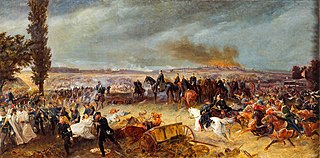
The Austro-Prussian War,, also known by many other names, was fought in 1866 between the Austrian Empire and the Kingdom of Prussia, with each also being aided by various allies within the German Confederation. Prussia had also allied with the Kingdom of Italy, linking this conflict to the Third Independence War of Italian unification. The Austro-Prussian War was part of the wider rivalry between Austria and Prussia, and resulted in Prussian dominance over the German states.
The history of Bavaria stretches from its earliest settlement and its formation as a stem duchy in the 6th century through its inclusion in the Holy Roman Empire to its status as an independent kingdom and finally as a large Bundesland (state) of the Federal Republic of Germany. Originally settled by Celtic peoples such as the Boii, by the 1st century BC it was eventually conquered and incorporated into the Roman Empire as the provinces of Raetia and Noricum.

Germans are the natives or inhabitants of Germany, or sometimes more broadly any people who are of German descent or native speakers of the German language. The constitution of Germany, implemented in 1949 following the end of World War II, defines a German as a German citizen. During the 19th and much of the 20th century, discussions on German identity were dominated by concepts of a common language, culture, descent, and history. Today, the German language is widely seen as the primary, though not exclusive, criterion of German identity. Estimates on the total number of Germans in the world range from 100 to 150 million, most of whom live in Germany.

Austrians are the citizens and nationals of Austria. The English term Austrians was applied to the population of Habsburg Austria from the 17th or 18th century. Subsequently, during the 19th century, it referred to the citizens of the Empire of Austria (1804–1867), and from 1867 until 1918 to the citizens of Cisleithania. In the closest sense, the term Austria originally referred to the historical March of Austria, corresponding roughly to the Vienna Basin in what is today Lower Austria.

The North German Confederation was initially a German military alliance established in August 1866 under the leadership of the Kingdom of Prussia, which was transformed in the subsequent year into a confederated state that existed from July 1867 to December 1870. A milestone of the German Unification, it was the earliest continual legal predecessor of the modern German nation-state known today as the Federal Republic of Germany.
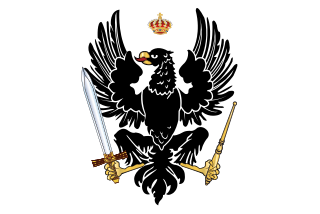
Prussia was a German state centred on the North European Plain that originated from the 1525 secularization of the Prussian part of the State of the Teutonic Order. The Knights had to relocate their headquarters to Mergentheim, but managed to keep land in Livonia until 1561.
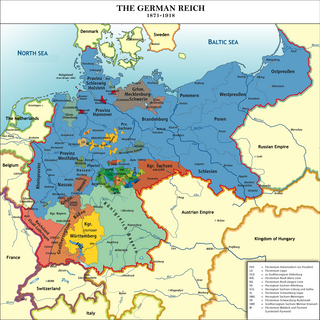
The unification of Germany was a process of building the first nation-state for Germans with federal features based on the concept of Lesser Germany. It commenced on 18 August 1866 with adoption of the North German Confederation Treaty establishing the North German Confederation, initially a military alliance de facto dominated by Prussia which was subsequently deepened through adoption of the North German Constitution.

German nationalism is an ideological notion that promotes the unity of Germans and of the Germanosphere into one unified nation-state. German nationalism also emphasizes and takes pride in the patriotism and national identity of Germans as one nation and one people. The earliest origins of German nationalism began with the birth of romantic nationalism during the Napoleonic Wars when Pan-Germanism started to rise. Advocacy of a German nation-state began to become an important political force in response to the invasion of German territories by France under Napoleon Bonaparte.

The Kingdom of Bavaria was a German state that succeeded the former Electorate of Bavaria in 1806 and continued to exist until 1918. With the unification of Germany into the German Empire in 1871, the kingdom became a federated state of the new empire and was second in size, power, and wealth only to the leading state, the Kingdom of Prussia.
The presence of German-speaking populations in Central and Eastern Europe is rooted in centuries of history, with the settling in northeastern Europe of Germanic peoples predating even the founding of the Roman Empire. The presence of independent German states in the region, and later the German Empire as well as other multi-ethnic countries with German-speaking minorities, such as Hungary, Poland, Imperial Russia, etc., demonstrates the extent and duration of German-speaking settlements.
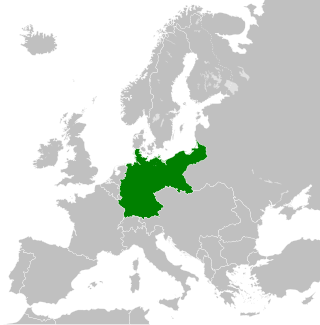
The territorial evolution of Germany in this article include all changes in the modern territory of Germany from its unification making it a country on 1 January 1871 to the present although the history of "Germany" as a territorial polity concept and the history of the ethnic Germans are much longer and much more complex. Modern Germany was formed when the Kingdom of Prussia unified most of the German states, with the exception of multi-ethnic Austria, into the German Empire. After the First World War, on 10 January 1920, Germany lost about 13% of its territory to its neighbours, and the Weimar Republic was formed two days before this war was over. This republic included territories to the east of today's German borders.
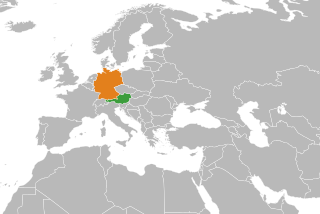
Relations between Austria and Germany are close due to their shared history, with German being the official language of both countries.
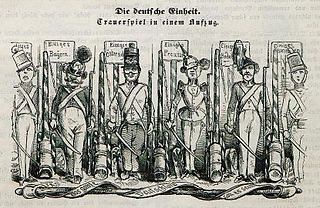
The "German question" was a debate in the 19th century, especially during the Revolutions of 1848, over the best way to achieve a unification of all or most lands inhabited by Germans. From 1815 to 1866, about 37 independent German-speaking states existed within the German Confederation. The Großdeutsche Lösung favored unifying all German-speaking peoples under one state, and was promoted by the Austrian Empire and its supporters. The Kleindeutsche Lösung sought to unify only the northern German states and did not include any part of Austria ; this proposal was favored by the Kingdom of Prussia.

German nationalism is a political ideology and historical current in Austrian politics. It arose in the 19th century as a nationalist movement amongst the German-speaking population of the Austro-Hungarian Empire. It favours close ties with Germany, which it views as the nation-state for all ethnic Germans, and the possibility of the incorporation of Austria into a Greater Germany.

Austrian nationalism is the nationalism that asserts that Austrians are a nation and promotes the cultural unity of Austrians. Austrian nationalism originally developed as a cultural nationalism that emphasized a Catholic religious identity. This in turn led to its opposition to unification with Protestant-majority Prussia, something that was perceived as a potential threat to the Catholic core of Austrian national identity. It was also used to protect the rule of the Habsburgs.
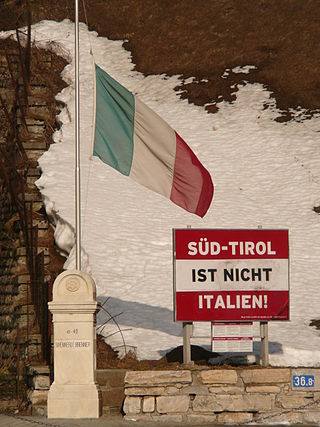
The South Tyrolean independence movement is a political movement in the Italian autonomous province of South Tyrol that calls for the secession of the region from Italy and its reunification with the State of Tyrol, Austria. Concurrently, some groups favor the establishment of an interim Free State of South Tyrol as a sovereign nation while reintegration is organized.



















